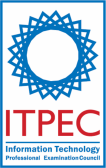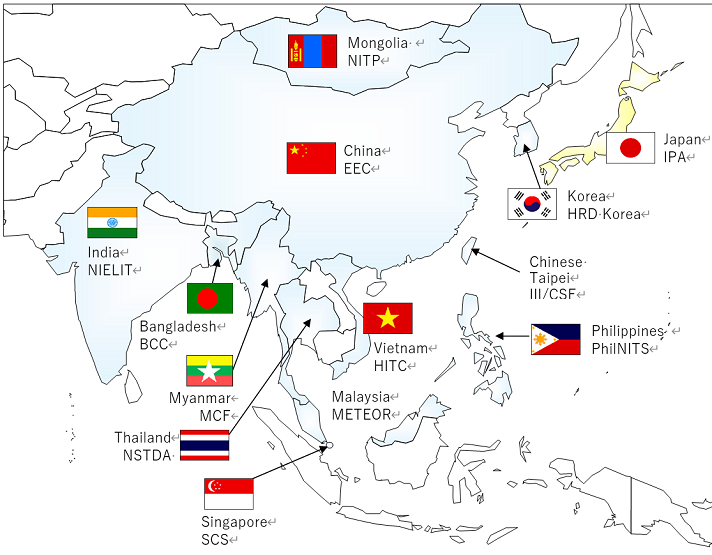Conducting national IT examinations

ITEE in Asia / ITPEC Common Examination
Last Updated:Apr 18, 2025
Mutual Recognition in Asia
In October 2000, the Japanese economic minister proposed Asian Common Skill Standard Initiatives for IT Engineer at the economic ministers meeting of ASEAN +3 (the People's Republic of China, the Republic of Korea, and Japan) in Chiang Mai, Thailand with the background of 30-year history of IT Engineers Examination in Japan. And it was adopted. The target of this initiative is to raise the skill level of IT engineers in each country, to increase cross-border job opportunities and to promote alliance of IT companies in the region. These can be implemented through establishing a similar system as Japan's IT Engineers Examination, ITEE, in each country and establishing mutual recognition agreement scheme with those systems.
Since then IPA has signed mutual recognition agreements with each of twelve partners, listed below.
INDIA
Feb, 9, 2001
Aug, 4, 2005 (revised)
Feb, 14, 2013 (revised)
- Exam Categories
-
AP,FE,SA
REPUBLIC OF SINGAPORE
Aug, 24, 2001
Nov, 19, 2011 (revised)
- Exam Categories
-
PM
REPUBLIC OF KOREA
Dec, 21, 2001
Jan, 11, 2011 (revised)
- Exam Categories
-
AP,FE
PEOPLE'S REPUBLIC OF CHINA
Jan, 31, 2002
Mar, 3, 2005 (revised)
May, 13, 2011 (revised)
- Exam Categories
-
NW,DB,AP,FE,PM,SA
CHINESE TAIPEI (TAIWAN)
Dec, 2, 2003
Apr, 25, 2005 (revised)
Nov, 8, 2006 (revised)
Jan, 21, 2013 (MCA)
[Note 1]
- Exam Categories
-
NW,AP,SC
REPUBLIC OF THE PHILIPPINES
Apr, 17, 2002
Feb, 14, 2012 (revised)
- Exam Categories
-
AP,FE,IP
KINGDOM OF THAILAND
Jun, 25, 2002
Feb, 14, 2012 (revised)
- Exam Categories
-
AP,FE,IP
SOCIALIST REPUBLIC OF VIETNAM
Jul, 4, 2002
Jan, 18, 2005 (revised)
Mar, 27, 2012 (revised)
- Hi-tech Incubation and Training Center (HITC)
- (formerly Vietnam Training and Examination Center (VITEC))
- Exam Categories
-
AP,FE,IP
REPUBLIC OF THE UNION OF MYANMAR
Nov, 13, 2002
Feb, 14, 2012 (revised)
- Exam Categories
-
AP,FE,IP
MALAYSIA
Jan, 5, 2005
Feb, 14, 2012 (revised)
[Note 2]
- Exam Categories
-
AP,FE,IP
MONGOLIA
Aug, 28, 2007
Feb, 14, 2012 (revised)
- Exam Categories
-
AP,FE,IP
PEOPLE'S REPUBLIC OF BANGLADESH
Sep, 1, 2014
- Exam Categories
-
AP,FE,IP
[Note 1] Chinese Taipei's examination system was transferred to CSF (Computer Skill Foundation) and III (Institute for Information Industry) from Chinese Taipei government at the end of 2012. In respond to this change, IPA signed MCA (Mutual Cooperation Agreement) with CSF and III for further cooperation on examination on Jan, 21, 2013, instead of MRA. Thus, the preferential immigration treatment is applied to the passers of mutually-certified examinations endorsed by Chinese Taipei government until the end of 2012.
[Note 2] ITPEC activities in Malaysia discontinued in September 2017.
Requirements for the mutual recognition agreement
(1) In case where there already exists an IT national examination and it is conducted
- The scope and level of examination category to be recognized is equivalent to these of the exam category of ITEE in Japan.
- Commitment is affirmed by the government about continuous financial support, or the examination implementing body has a strong financial base.
- It is expected to conduct the examination continuously.
[Cases of this type] India, Singapore, Korea, China, and Chinese Taipei (Taiwan)
(2) In case where there is no IT national examination
- The IT examination is authorized as a national examination by the government.
- There exists an organization to conduct the IT examination, and departments for holding the examination and for preparing questions are organized in it.
- The scope and level of examination category to be recognized is equivalent to these of the exam category of ITEE in Japan.
- Commitment is affirmed by the government about continuous financial support, or the examination implementing body has a strong financial base.
- Needs and demands for the examination is continuously expected, and the examination can be conducted stably.
- The examination is expected to be conducted fairly and reliably enough through two trial examinations.
[Cases of this type] Philippines, Thailand, Vietnam, Myanmar, Malaysia, Mongolia, and Bangladesh
Note: ITPEC activities in Malaysia discontinued in September 2017.
ITPEC (Information Technology Professionals Examination Council)
Information Technology Professionals Examination Council (ITPEC) was established in November 2005 to benefit, assist and advance ITEE in Asian countries. The council agreed to conduct the examination on the same date and time with the same set of questions, so that the examination is consistent among all of the member countries. This consistency enables accurate measurement of the skills of the examinees in any of these countries.
Currently ITPEC Common Examination has been conducted in the Philippines, Thailand, Vietnam, Myanmar, Malaysia, Mongolia, and Bangladesh biannually, in April and October.
References to Japan's ITEE
References to Japan's ITEE in English are available here.
Preferential Immigration Treatment based on MRA
ITEE is institutionalized by Public Notice of the Ministry of Justice in order to increase the mobility of IT engineers. To the passers and holders of the examinations and the qualifications listed in the Public Notice*1, a preferential immigration treatment is applied. It is about the criteria pertaining to the status of residence, which is required to work in Japan as Engineer or for Designated Activities. To be more precise, when they apply for the certificate of eligibility in order to state he/she conforms to the conditions for the status of residence of Engineer or for Designated Activities, the applicant must fulfill all of following conditions.
- (i) The applicant must meet one of the following 2 conditions regarding skill and/or knowledge.
- (a) The applicant must have graduated from university or acquired an education equivalent thereto while majoring in a subject related to the skills and/or knowledge necessary for performing the duties in which he/she intends to engage.
(b) The applicant must have at least 10 years' experience.
- (a) The applicant must have graduated from university or acquired an education equivalent thereto while majoring in a subject related to the skills and/or knowledge necessary for performing the duties in which he/she intends to engage.
- (ii) The applicant must receive no less remuneration than would a Japanese national for comparable work.
Through this preferential treatment, if the applicant has passed the examination or obtained the qualification listed in the Public Notice, the requirement under item (i) need not be fulfilled. In regards to Indian's qualification, it is also to meet the requirement for this certificate of eligibility.
Also every exam/qualification category listed in the Public Notice can be included “Point-based preferential immigration treatment for highly skilled foreign professionals” system*2. 5 points are given per each exam/qualification, and 10 points at a maximum.
-
*1Establishment of Special Provisions to Criteria Pertaining to the Status of Residence of “Engineer” and “Designated Activities” under the Ministerial Ordinance to Provide for Criteria Pursuant to Article 7, paragraph (1), item (ii) of the Immigration Control and Refugee Recognition Act
- The English notice in this page hasn’t included the latest notice published in November 2013 yet. So, this can be referred just for information.
-
*2Points-based Preferential Immigration Treatment for Highly Skilled Foreign Professionals
- Overview
- Point Evaluation Mechanism, Point Calculation Form
- ‘IT notification’ in the section of ‘License’ in ‘Point Calculation Table for Highly Skilled Foreign Professionals (Advanced specialized / technical activity)’ means the public notice above.


